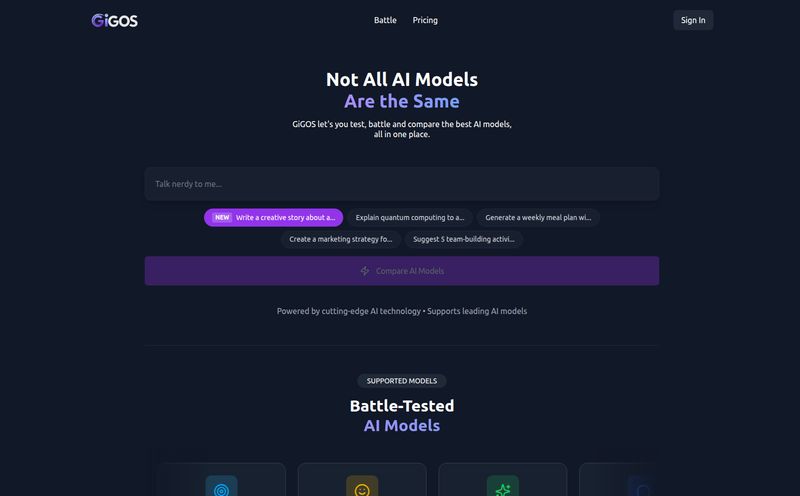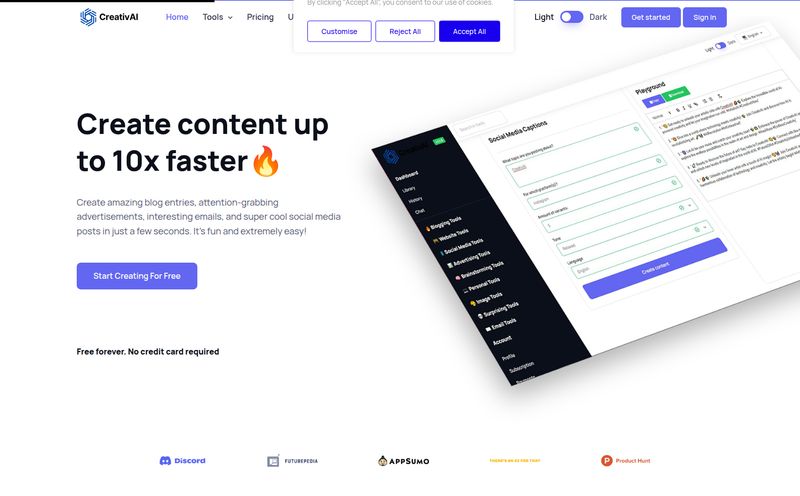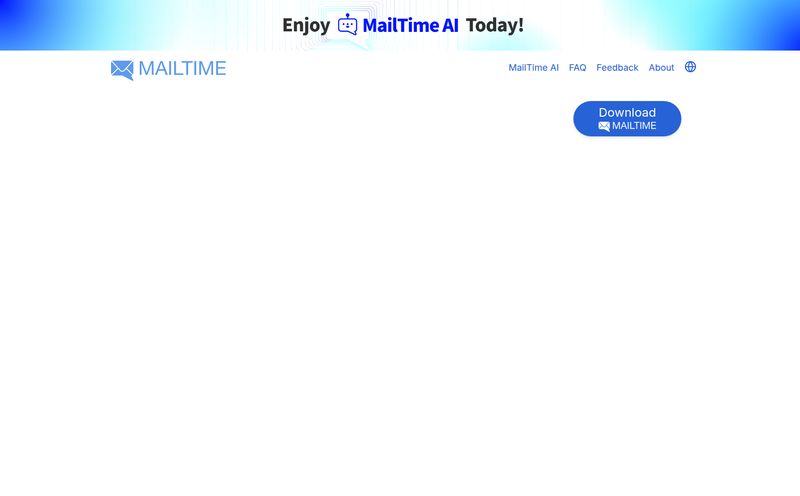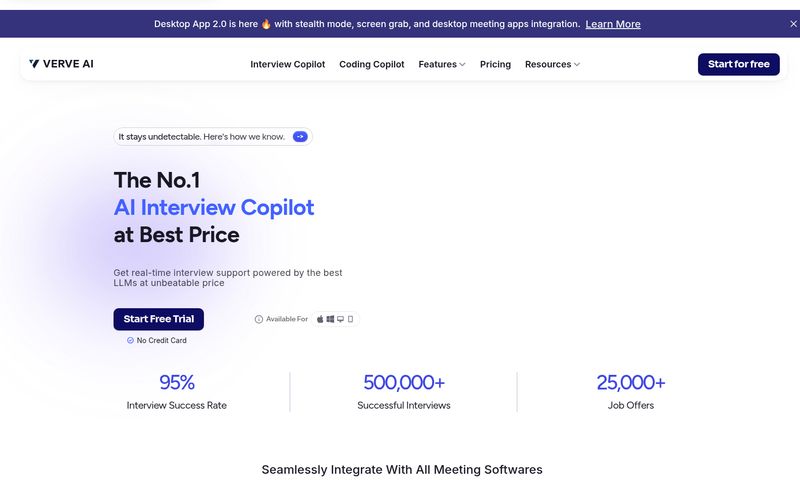For years, the world of data analysis has been a bit…gatekept. If you weren't fluent in Python or couldn't whip up a SQL query in your sleep, you were on the outside looking in, begging the overworked data team for a simple bar chart. I've spent more hours of my life than I care to admit staring at messy CSV files, wrestling with VLOOKUPs that refuse to cooperate, and trying to make a pivot table look, well, not hideous.
Then AI came along, promising to change everything. We've seen a flood of tools that claim to be your “AI data assistant.” Most are either too simplistic or just a fancy wrapper for a GPT-4 API call. So, when I came across skills.ai, I was naturally skeptical. Another one? But the promise was alluring: an AI you can genuinely talk to about your data. Not just fetch simple facts, but uncover insights, build reports, and even see the code behind the magic.
So I rolled up my sleeves, grabbed a few gnarly datasets I keep for just such an occasion, and took it for a spin. This is my no-fluff, hands-on review of whether skills.ai is the real deal.
What Exactly Is skills.ai?
At its heart, skills.ai is an AI-powered data analytics platform. But that's a mouthful of jargon. Think of it this way: it’s a tool that lets you have a conversation with your spreadsheets. You upload your data (from Excel, a CSV file, or even directly from Google Sheets), and then you just… ask it questions. In plain English.
It's designed for a pretty broad audience—from business executives who need a quick sales number for a meeting, to data analysts who want to speed up their workflow. The whole point is to tear down the technical barrier. Instead of writing code to group, filter, and visualize data, you just ask, "What were our top 5 selling products last quarter in the Midwest?" and it generates the answer, a chart, and the insights to go with it.
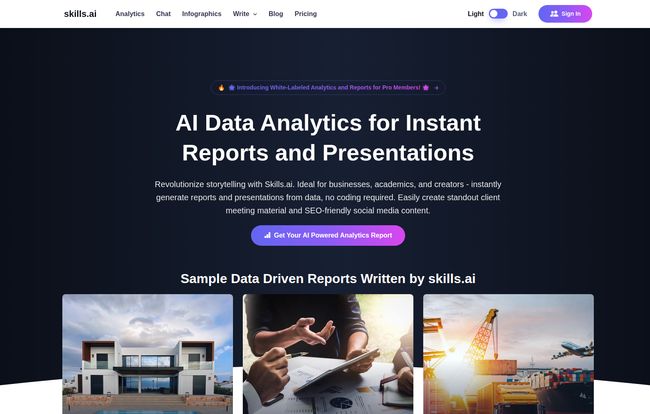
Visit skills.ai
My First Impressions and Getting Started
Signing up was straightforward. The interface is clean, which I appreciate. No clutter, no confusing dashboards with a million buttons. The first thing I did was connect a Google Sheet. As someone who lives in the Google Workspace ecosystem, this integration is a massive plus. It's so much better than constantly downloading and re-uploading CSVs every time data gets updated.
I uploaded a dataset from a recent (and fictional) marketing campaign. It had daily spend, clicks, conversions, and breakdowns by platform and ad creative. Usually, pulling insights from this would take me a solid hour of filtering and pivot-table-ing. It was time to put the AI to the test.
The Core Features That Actually Matter
A tool can have all the bells and whistles, but only a few features truly define its worth. For skills.ai, it comes down to a few game-changers.
The AI Data Chat: A Conversation with Your Numbers
This is the main event. The AI Data Chat Q&A Bot is where you interact with your data. I started simple:
"Show me total spend vs. total conversions."
Within seconds, I had a scatter plot and a brief summary. Okay, not bad. Let's try something a bit more complex.
"Which ad creative had the best conversion rate on Facebook last week?"
Again, it nailed it. It didn't just give me a number; it presented a small table and a sentence explaining the result. This is where it starts to feel less like a tool and more like a colleague. I didn’t have to manually filter for 'Facebook', then calculate 'conversions / clicks' for each creative. It just understood the intent. It's the kind of thing that saves you 15-20 minutes right there, and those minutes add up fast.
From Questions to Visuals in Seconds
One of my biggest pet peeves with data work is making the visuals look good for a presentation. skills.ai handles this automatically. When you ask a question, it often generates a chart that it thinks is most appropriate. Asking for a trend over time gives you a line chart; asking for a breakdown by category gives you a bar chart. It's usually right.
It even has a feature for creating AI-powered infographics. This is a nice touch for those times you need to build a report for stakeholders who don't want to see a wall of spreadsheets. It helps you tell the story behind the numbers, which is arguably the most important part of data analysis.
The Full Code Traceback: A Transparency Win
Okay, this is my favorite feature, and it's what sets skills.ai apart from being just another AI black box. For every insight or chart it generates, you can view the full Python code it used to get there. Why is this so huge? Trust.
As an SEO and data guy, I can't just trust a machine's output blindly. I need to know how it got the answer. Did it calculate 'conversion rate' correctly? Did it filter the dates properly? With the code traceback, I can see the exact pandas script it ran. This is brilliant for two reasons:
- For professionals: It allows for validation and debugging. You can trust the output because you can verify the method.
- For learners: It's an incredible learning tool. A junior analyst can ask a question in English, see the result, and then study the Python code that produced it. It’s like having a senior data scientist on call, showing you how to do things.
How Does skills.ai Stack Up Against The Competition?
The marketing site has one of those comparison tables, and they're usually biased, right? But looking at the points, they actually hit on some real pain points of other tools I’ve used. For instance, many AI tools are stuck on older models, while skills.ai claims to use the latest AI, which likely explains the better natural language understanding I experienced.
The code traceback is another big differentiator. Most competitors give you an answer, but not the 'how'. It's a black box. The table below is a quick summary of what they claim, which seems to align with my experience.
| Feature | skills.ai | Other Generic Tools |
|---|---|---|
| AI Model | Uses the latest AI model | Often limited to older, less capable models |
| Code Transparency | Full Python code traceback | Usually a 'black box' with no code shown |
| Reporting | Automated reporting and infographics | Limited or manual report creation |
| Data Limits (on free plans) | Generous for testing purposes | Often very restrictive |
Let's Talk About The Price Tag
No review is complete without looking at the cost. Pricing can make or break a tool, and skills.ai has a few tiers. Here’s my breakdown of their plans:
| Plan | Price | Who It's For |
|---|---|---|
| Free | $0 | Perfect for a test drive. You get 200 questions and can upload a couple of datasets. Enough to see if it works for you, but you'll hit the limits quick. |
| Basic | $19 /month | The occasional user. A small business owner or marketer who needs to check in on data once or twice a week. |
| Pro | $29 /month | This is the sweet spot. It’s for freelancers, data analysts, and anyone who works with data daily. For less than a dollar a day, the time savings are a no-brainer. |
| Team | $99 /seat/month | For agencies and larger companies that need multiple users, better support, and more robust features. |
Honestly, the pricing feels very fair. The Pro plan at $29 a month is incredibly competitive. If this tool saves me even two hours of work a month, it has already paid for itself. And it will absolutely save more than that.
The Good, The Bad, and The Just Okay
What I Really Liked
The speed is the first thing. The time from question to insight is genuinely just seconds. The no-code aspect is also a huge win, making powerful analysis accessible to non-technical folks. I also cant overstate how great the Google Sheets integration and code traceback features are. They show a real understanding of what analysts and marketers actually need in their day-to-day workflow.
Some Things to Keep in Mind
No tool is perfect. The free plan's limitations, while understandable, mean you have to be strategic with your 200 questions. Also, their data retention policy on some plans is 30 days. This means it's a tool for active analysis, not long-term data warehousing. You'll want to keep your primary data stored elsewhere, which is good practice anyway. For businesses with super strict data governance, you'll need to look at the Team plan and probably have a chat with their sales team.
Who Should Use skills.ai (And Who Might Want to Pass)?
After playing around with it, I have a clear idea of who gets the most out of this.
- The Overwhelmed Marketing Manager: This is a dream tool. Get quick campaign insights and reports without having to wait for the analytics team. Absolutely get it.
- The Junior Data Analyst: A fantastic productivity booster and learning aid. Automate the boring stuff and learn how the code works behind the scenes. Highly recommended.
- The Hardcore Data Scientist: You'll probably still live in your Jupyter notebooks for complex modeling. But for fast exploratory data analysis (EDA) and generating quick charts for a presentation? This could save you a ton of time. Worth a try.
- The Small Business Owner: You wear a lot of hats, and 'data scientist' probably isn't one of them. This tool makes your sales and customer data understandable. The Basic or Pro plan is a great investment.
Frequently Asked Questions About skills.ai
- Do I need to know how to code to use skills.ai?
- Nope. Not at all. That's the whole point. You just ask questions in plain English. If you DO know how to code, the code traceback is a great bonus feature.
- What kind of data can I import?
- You can import data from Excel files, CSVs, and directly connect to Google Sheets. This covers the vast majority of use cases for most people.
- How is this different from just pasting my data into ChatGPT?
- Great question. skills.ai is a purpose-built analytics environment. It's optimized for structured data, provides interactive charts, ensures better security than a public model, and offers features like code traceback. ChatGPT is a generalist; skills.ai is a specialist.
- Is my data secure?
- The platform is designed for professional use, so data security is a priority. For specific compliance or governance questions, especially for enterprise use, it's always best to consult their documentation or contact their team directly.
- Is the free plan actually useful?
- Yes, for a trial. It’s more than enough to upload a real dataset and ask a few dozen questions to see the power for yourself. You'll quickly know if it's worth upgrading to a paid plan.
- Can I cancel my subscription anytime?
- According to their site, yes. They offer monthly and annual plans, and you can cancel a subscription to prevent it from renewing. Standard practice for SaaS tools these days.
So, What's The Final Verdict?
I came in skeptical, and I'm leaving impressed. skills.ai isn't just another AI gimmick. It's a genuinely useful tool that lowers the barrier to data analysis and acts as a massive time-saver for those already in the field. It’s like having a sharp, fast, junior data analyst on your team for $29 a month.
It successfully bridges the gap between complex data and clear, actionable insights. The combination of a natural language interface with the transparency of code traceback is a winning formula. If you work with data in any capacity—marketing, sales, operations, or analysis—you owe it to yourself to give the free plan a try. It might just change how you look at a spreadsheet forever.
